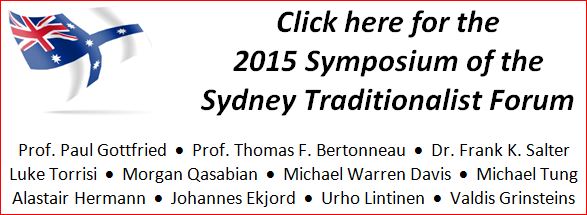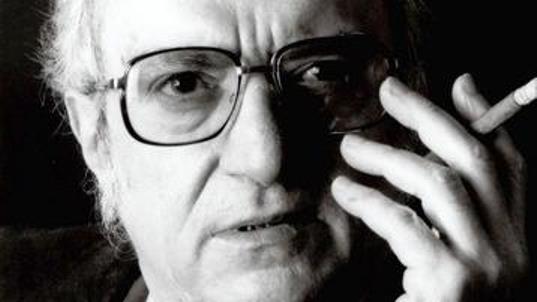Impressions from the Old Continent
I
Introduction
2015 has seen steadily escalating polarization of political lines dividing European public sphere due to the re-emergence of the Greek financial crisis, rapidly increasing numbers of migrants coming from Islamic countries and the ongoing conflict in Ukraine. These crises did not emerge out of the blue and they highlight the pervading sclerosis of political decision-making capabilities at both European and national levels. On the surface, we can spot a number of political juxtapositions: environmentalists against industrialists, free-market liberals against social liberals, euro-critics against euro-socialists/federalists, anti-immigration-activists against Open Borders-advocates, and so on. The longer political problems linger unresolved, the more intense and curiously intertwined political creeds will become.

Zygmunt Bauman
Now why have I excluded Traditional Conservatives from these games of confrontation? The reason for this is quite simple: what those aforementioned juxtapositions have in common is that they inhabit the same ideological platform which Zygmunt Bauman has defined as ‘Liquid Modernity’ or what Traditional Conservatives simply call Liberalism. One quickly sees that the nomads of this Liberal platform share few characteristics such as relativism, globalism, rootlessness, ahistoricism and a dedication to the politics of emancipation of the individual; on the other side of the pond we find Traditional Conservatives who value a sense of belonging to community of values, transcendental order and an ever flowing stream of history and who are committed to the politics of restraint. What follows is a presentation of my personal reflections and observations about the situation of Traditional Conservativism trying to survive in our ironic age of democracy and man.
II
Reclaiming the Language
One of the most pernicious signs of modern age is the growing chasm between form and content in conceptual thought. We have seen a plethora of new words emerging from the liberal world and a number of attempts to strip concepts of their traditional meaning of which the definition of “marriage” gives us the most illustrious example how the meaning of a word is severed from its cultural and religious connotations and ultimately reduced to a purely legalistic concept. However, there are some encouraging examples which show that traditional concepts have not lost their appeal: in case of gay marriage we have seen La Manif Pour Tous protests in France and other European nations. More recently in Finland an appeal for the preservation of traditional marriage just passed the mark of 100.000 signatures which means that the Finnish Parliament has to take the Citizen’s initiative into its proceedings despite the fact it had already voted in favor of the gay marriage bill.1
Regarding the migrant crisis, it is to be expected that attempts to blur the lines between different categories of migrant status will only intensify in order to justify an intake of migrants without proper scrutiny and regardless of actual costs by using strategies of political emotivism and utilitarianism. To repeat: it is of outmost importance to preserve the proper conceptual nature of words stemming from Conservative tradition if we wish to be understood and not to give the upper hand to our opponents. Whoever masters the grammar, rules the world.
III
Too many lilies on the field?
In the public sphere, the Conservative worldview manifests itself through isolated incidents related to specific topics and although this in itself is not a problem, it has the troublesome tendency to narrow the public perception of Conservativism down to a single-issue movement which is enforced by the superficiality of media treatment and failures to turn reaction into counter-reaction. Although it is much easier to challenge the dominant narrative these days thanks to multiplication of media platforms, in most cases these confrontations rarely evolve into anything greater than opponents beating each other silly with anecdotal evidence and usually individuals with the most outrageous comments are made representatives of the whole movement. However, the case of MP Olli Immonen is a fine example how to make most out of a situation which would generally be described as a public relations disaster. Earlier this year, Immonen wrote on his FaceBook profile:
I’m dreaming of a strong, brave nation that will defeat this nightmare called multiculturalism. This ugly bubble that our enemies live in, will soon enough burst into a million little pieces. Our lives are entwined in a very harsh lies. These are the days that will forever leave a mark on our nations future. I have strong belief in my fellow fighters. We will fight until the end for our homeland and one true Finnish nation. The victory will be ours.2 [sic]

Olli Immonen
After days of public outcry over Immonen’s statement, he made another public announcement in which he explained his earlier Facebook post was an expression of support for like-minded compatriots and clarified that he would fight extreme phenomena related to multiculturalism via political means only. But, notably, while he didn’t provide any apology, as an act of repentance he indicated that would withdraw from the work of his parliamentary group until mid of October.
So, who won and who lost? Most notably the Greens (Vihreä Liitto) managed to gain a small bump in the polls by becoming the foremost champions of multiculturalism; the government parties, including the (True) Finns, managed to dodge the bullet by making vague and predictable statements; but the unexpected winner was an organization dedicated to the promotion of Finnish values and traditions called Suomen Sisu, which received over 600 membership applications as a result of this spectacle and it happens to be chaired by Olli Immonen. Obvious lesson from this incident and countless other similar events is that one shouldn’t shy away from confrontation but one shouldn’t plunge into a fight recklessly.
In summary: what lies beneath the fragmentary nature of Conservative action is the lack of awareness of Conservative thought and its mosaic structure compared to crystal palaces of ideology. In this regard it’s great to see that the number of websites, online groups and other kinds of activities dedicated to Traditional Conservatism and its various offshoots have increased significantly and helped to ameliorate the overall situation but there’s still much work to be done in connecting political events to a bigger picture and building up momentum for Traditional Conservativism.
IV
A Deal with the Devil
Bargaining is one of the defining features of the present political systems of the Occident and occasionally Conservative politicians and parties find themselves in a situation where real political power or a chance to gain power is offered at a price. Inside party politics, many people fall for the temptation of immediate gain and they may justify this by claiming to be Machiavellians who are playing by the rules for the time being and waiting for the right moment to strike. Certainly, this scenario may come to fruition but odds are against it for the following reasons: first of all, by becoming a political team player one immediately becomes aligned to team’s program publicly and with alignment comes the demand of obedience; second, publicly declared commitment narrows the field of operation significantly, fantasies of pulling a cloak and dagger stunt are often implausible and eventually the political team player’s only form of protest is to shake his fist rigorously when no one is watching; and finally in the third phase political team player is left alone with his compromised principles and in the eyes of others he’s no longer regarded as sound.
This year the Finns Party (Perussuomalaiset) decided to roll the dice and participate in the current government which meant making compromises over issues such as immigration, the Greek crisis and European Union policy. The main reason for this was the desire to stabilize the position of the Finns Party as one of the Big Four parties and prevent the possible decay which happened to its spiritual predecessor, the Finnish Rural Party (Suomen Maaseudun Puolue). But nothing in life goes according to plan and although the government negotiations and policies have already tested the backbone of the Finns Party, the immigration issue threatens to tear the party open. Voices demanding a tougher stance are getting louder and few of their notable politicians are already questioning the point of continuing in a government whose policies go against the Party’s previous stances.
Ultimately, political power can only be wielded but never permanently possessed, and it remains to be seen whether the Finns Party can weather the storm. Although European politics is in a state of growing agitation, Traditional Conservatives should rein in their passions and still be prepared to play the long game as disciples of Machiavelli and Clausewitz.
V
The Need for a Narrative
The political belongs to the realm of human action and we may regard it as a bridge between mundane world and transcendental order. Further, since politics deals with human affairs through speech, it is preoccupied not with logic but rhetoric, the art of persuasion, and if we make a distinction between politics of action and of inaction, we can determine with the help of literary theory that the narrative of romance (heroic tale) belongs to the first and tragedy to the latter.3
Earlier I have paid attention to the lack of sufficient coherence of Traditionalism Conservativism in the public sphere for which the development of romance narrative could prove to be a potent remedy. The romance narrative is very suitable for political purposes because it is characterized by the dialectic of hero/enemy, its’ three phases (conflict – death struggle – recognition of the hero and the recreation of a world of idealized past) are helpful in turning Traditional Conservative ideas into a digestible form and it is quite malleable for particular issues and contexts.
The preservation of a Conservative lexicon, strengthening Conservative grammar and formulation of universal narrative are the three tasks I consider to be of utmost importance for Traditional Conservatism if it is to survive the drastic changes taking place in our age. For what good is it to possess political finesse if it isn’t backed by sturdy pillars?4
– Urho Lintinen holds a Master of Social Sciences from the University of Jyväskylä, Finland.
Endnotes:
- “Citizens’ initiative with over 100,000 signatures is challenging the same-sex marriage bill in the Finnish parliament!” Aito Avioliitto (online: English section) (30 September 2015) <aitoavioliitto.fi/english> (accessed 7 October 2015).
- “Finnish MP calls for fight against ‘nightmare of multiculturalism’, no comment from party leadership” YLE Uutiset (online) (26 July 2015 @ 11:45; updated 26 July 2015 @ 15:42) <yle.fi/uutiset> (accessed 7 October 2015).
- See: Northrop Fry, Anatomy of Criticism (new ed., Princeton: Princeton University Press, 2000 [1957]).
- [SydneyTrads Editors: for more on the situation in the Scandinavian countries and Central Europe, readers are encouraged to read the following two other contributions to the Symposium: Valdis Grinsteins, “When a Conservative Feels the he is a Foreigner in his own Home” SydneyTrads (17 October 2015) <sydneytrads.com> (accessed 17 October 2015) and Johannes Ekjord, “The Rise of the Right in Europe: The Need for Traditionalism” SydneyTrads (17 October 2015) <sydneytrads.com> (accessed 17 October 2015)].
Citation Style:
This article is to be cited according to the following convention:
Urho Lintinen, “Impressions from the Old Continent” SydneyTrads – Weblog of the Sydney Traditionalist Forum (17 October 2015) <sydneytrads.com/2015/10/17/2015-symposium-urho-lintinen> (accessed [date]).






Leave a comment